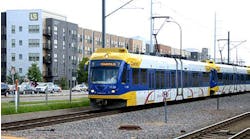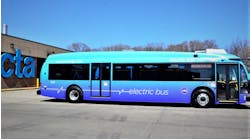The Chicago Transit Authority has proposed a balanced $1.524 billion operating budget that holds the line on base fares and preserves bus and rail service levels, while continuing historic investment to modernize the CTA and improve the customer experience.
“CTA’s responsible budget will continue to create a 21st century transit system by focusing on enhancing service to riders while continuing the historic level of investment in modernization of our transit system,” said Mayor Rahm Emanuel. “Investing in CTA and its customers creates economic benefits for our City, our neighborhoods and our residents by connecting people with jobs, education and opportunity.”
The CTA is also proposing a $3.5 billion five-year capital budget for 2017-2021, continuing
more than $5 billion of historic transit investment completed, begun or announced by Mayor Emanuel since 2011. Those projects include rehabilitating rail stations and building new ones, modernizing rail and bus fleets, removing rail slow zones and adding new technologies—work that improves reliability, reduces commuting times, strengthens safety and security, and improves the overall commuting experience.
“Over the last five years, Mayor Emanuel’s investment in Chicago transit has provided CTA customers with improved, more reliable and affordable transit service, and I am committed to continuing that work,” said CTA President Dorval R. Carter, Jr. “Equally important with keeping up with meeting the needs of our customers is to continually find ways to do so more efficiently and cost-effectively. I look forward to continuing the many improvements the CTA has made thus far, and exploring new and even better ways to provide vital transit services to our customers.”
CTA’s 2017 operating budget freezes base fares for an eighth straight year and continues the expanded service begun in 2015 and 2016. The agency has been able to maintain fares by strategically pursuing management efficiencies and cost savings through reducing ongoing maintenance needs by modernizing the fleet, pre-purchasing diesel fuel and electricity at historically low levels and through responsible spending practices.
The agency continues to focus on growing revenue beyond the farebox to support operations through advertising, retail concessions and other non-fare related sources.
CTA continues to face funding challenges to meet its ambitious modernization goals, including a lack of funding from the state for capital projects and sufficient reimbursements for the mandated free and reduced-fare rides for eligible customers. However, the agency’s operating budget is balanced for the sixth straight year and its capital budget preserves the historic level of transit investment that is building a world-class, 21st century transit system that will serve the Chicago region for generations to come.
CTA in 2017 will continue to pursue long-term priorities, which focus on improving service to customers. The agency will continue to make extensive investments in its bus and rail system – including some of the largest station reconstruction projects in CTA history, such as the Red-Purple Modernization project, a $2.1 billion investment to modernize and add capacity to the CTA’s busiest rail corridor. CTA will also continue to enhance the overall customer experience by investing in public art at our rail stations.
CTA will continue to leverage technology for customers, from expansion of transit tracker to new features on the Ventra fare payment app, which recently reached 1 million downloads less than a year after launch.
Safety and security continues to remain a top priority. CTA continues to work closely with our partners in the federal government to implement the nation’s first Safety Management System Program, designed to enhance the culture of safety among the agency’s 11,000 employees.
Among the capital projects to continue or begin in 2017:
- Completion of the Wilson Station Reconstruction Project at the end of 2017
- Completion of Washington-Wabash station in 2017
- Continuation of the complete reconstruction of the 95th Street Terminal on the Red Line
- Continuing work on Phase 1 of the Red and Purple Modernization Program, which includes rebuilding four Red Line stations and constructing a rail bypass
- Select a final alignment for a proposed Red Line Extension from 95th Street to 130th Street and perform additional project engineering work
- Your New Blue program to upgrade the Blue Line O’Hare branch
- Ravenswood Corridor signal improvements to benefit Brown, Purple Express between Armitage and the Merchandise Mart stations
- Upgrade and accessibility improvements to Quincy Loop ‘L’ station and Illinois Medical District Blue Line stations
- Belmont Blue Gateway project
- Garfield Green Gateway project
- Complete 3200-series overhaul
Many of the capital projects will feature distinctive architecture and public art from notable Chicago and international artists, part of ongoing efforts to make public transportation more attractive and to highlight communities.
A public hearing will be held on Monday, November 14, 2016 at 6 p.m. at CTA headquarters, 567 W. Lake Street, second floor conference room, Chicago, Illinois, 60661.
Written and oral comments will be taken into consideration prior to Chicago Transit Board action. This input will be welcomed at the hearing or by correspondence addressed to Gregory P. Longhini, Assistant Secretary of the Board, Chicago Transit Authority, P.O. Box 7567, Chicago, Illinois 60680-7567. Comments also may be submitted in writing either via email to: [email protected] or via fax: 312-681-5035. The deadline to submit written comments is 5 p.m. Tuesday, November 15, 2016.



